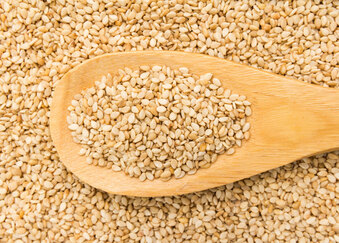|
Research continues to shed light on the health benefits of nuts and seeds. Flaxseeds, chia seeds, and sunflower seeds are well-known options, but there are several lesser-known varieties of readily available seeds with potential health effects.
General Characteristics of Seeds Seeds contain the embryo of future plants. To support their development from embryo to plant, seeds are endowed with ample energy and nutrients. This efficient packaging makes seeds calorie dense, so it is important to be aware of appropriate portion sizes when eating seeds as a snack or ingredient. Unique nutrition profiles exist for different seed varieties, therefore, including a diverse array of seeds in your diet can promote health. Seeds are typically a source of protein, unsaturated fats, minerals, and phytonutrients. For individuals with nut allergies, seeds and seed butters offer excellent substitutes! Consider trying one or all of these tasty and nutritious superstar seeds: Sesame seeds are a good source of fiber, which not only supports digestive health but may play a role in reducing risk of obesity, type 2 diabetes, certain cancers, and heart disease. Some studies indicate that regular consumption of sesame seeds may help reduce cholesterol and triglycerides. Sesame seeds also provide phytonutrients (lignans and phytosterols) that may have cholesterol-lowering effects. These tiny seeds supply 5 grams of protein per 3-Tbsp serving and the micronutrients B-vitamins, iron, zinc and copper. Unhulled sesame seeds are especially rich in calcium, a nutrient vital to bone health. Try adding sesame seeds to cereal, stir-fries or steamed veggies, smoothies, or salad dressings. Check out the Sesame Spring Salad recipe for another delicious idea! Pumpkin seeds contain a range of beneficial nutrients, including sterols, magnesium, and polyunsaturated fatty acids. Research indicates that the nutrients in pumpkin seeds may protect against type 2 diabetes and heart disease as well as promote bone health. Pumpkin seeds are a rich source of the amino acid tryptophan, which the body converts into serotonin, a neurotransmitter that promotes relaxation. Pumpkin seeds are a great snack and add crunch and taste to recipes. Top a salad with pumpkin seeds or make homemade pumpkin seed butter by blending whole, raw pumpkin seeds in a food processor. Tomato seeds may be more difficult to digest than most seeds, but they are worth the trouble since they provide a healthy dose of vitamins A and C, potassium and fiber. The seeds also contain lycopene, a phytonutrient known to reduce cancer risk; cooking helps activate lycopene in tomato seeds. The seeds are often consumed dried, but can be enjoyed in tomato sauces or as part of whole tomatoes. References: Carolina Alves Cardoso, Gláucia Maria Moraes de Oliveira, Luciana de Almeida Vittori Gouveia, Annie Seixas Bello Moreira & Glorimar Rosa (2018) The effect of dietary intake of sesame (Sesamumindicum L.) derivatives related to the lipid profile and blood pressure: A systematic review, Critical Reviews in Food Science and Nutrition, 58:1, 116-125, DOI: 10.1080/10408398.2015.1137858 González, Mónica, M. Carmen Cid, and M. Gloria Lobo. "Usage of tomato (Lycopersicum esculentum Mill.) seeds in health." Nuts and seeds in health and disease prevention. Academic Press, 2011. 1123-1132. Sesame Spring Salad 1 pound fresh asparagus, trimmed and cut into 2-inch pieces 7 radishes, thinly sliced 2 tablespoons sesame seeds Dressing: 2 tablespoons olive oil 2 tablespoons thinly sliced green onion 1 tablespoon white wine vinegar 1 tablespoon lemon juice 2 teaspoons honey 1 teaspoon Dijon mustard 1/4 teaspoon garlic powder 1/4 teaspoon grated lemon zest 1/4 teaspoon pepper In a large saucepan, bring 6 cups of water to a boil. Add asparagus; cover and boil for 3 minutes. Drain and immediately place asparagus in ice water. Drain and pat dry. Transfer to a large bowl; add radishes and sesame seeds. Place dressing ingredients in a jar with a tight-fitting lid; shake well. Pour over salad; toss to coat.
4 Comments
|
CategoriesAll Cross Training Injury Prevention Nutrition Recipes Wellness Archives
October 2021
|

 RSS Feed
RSS Feed